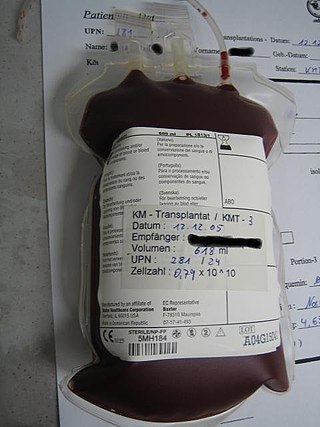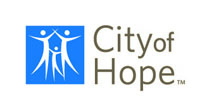Related Research Articles

Hematopoietic stem-cell transplantation (HSCT) is the transplantation of multipotent hematopoietic stem cells, usually derived from bone marrow, peripheral blood, or umbilical cord blood, in order to replicate inside a patient and produce additional normal blood cells. HSCT may be autologous, syngeneic, or allogeneic.

Edward Donnall "Don" Thomas was an American physician, professor emeritus at the University of Washington, and director emeritus of the clinical research division at the Fred Hutchinson Cancer Research Center. In 1990 he shared the Nobel Prize in Physiology or Medicine with Joseph E. Murray for the development of cell and organ transplantation. Thomas and his wife and research partner Dottie Thomas developed bone marrow transplantation as a treatment for leukemia.
Cord blood is blood that remains in the placenta and in the attached umbilical cord after childbirth. Cord blood is collected because it contains stem cells, which can be used to treat hematopoietic and genetic disorders such as cancer.

Moffitt Cancer Center & Research Institute is a nonprofit cancer treatment and research center located in Tampa, Florida. Established in 1981 by the Florida Legislature, the hospital opened in October 1986 on the University of South Florida's campus. Moffitt is one of two National Cancer Institute-designated Comprehensive Cancer Centers based in Florida. In 2021, U.S. News & World Report ranked Moffitt Cancer Center as a top 30 cancer hospital in the United States.

M Health Fairview University of Minnesota Medical Center (UMMC) previously known as University of Minnesota Medical Center, is a 1700-bed non-profit, tertiary, research and academic medical center located in Minneapolis, Minnesota, servicing the entire region. UMMC is the region's only university-level academic medical center. The hospital is operated by the M Health Fairview Health System and the largest hospital in the system. UMMC is affiliated with the University of Minnesota Medical School. UMMC is also an ACS designated level II trauma center and has a rooftop helipad to handle medevac patients. Attached to the medical center is the Masonic Children's Hospital that treats infants, children, adolescents, and young adults up to the age of 21.

The University of Minnesota Medical School is a medical school at the University of Minnesota. It is a combination of three campuses located in Minneapolis, Duluth, and St. Cloud, Minnesota.
NMDP, formerly known as the National Marrow Donor Program and Be The Match, is a nonprofit organization founded in 1987 and based in Minneapolis, Minnesota, that operates a registry of volunteer hematopoietic cell donors and umbilical cord blood units in the United States.

City of Hope is a private, non-profit clinical research center, hospital and graduate school located in Duarte, California, United States. The center's main campus resides on 110 acres (45 ha) of land adjacent to the boundaries of Duarte and Irwindale, with a network of clinical practice locations throughout Southern California, satellite offices in Monrovia and Irwindale, and regional fundraising offices throughout the United States.

Robert Peter Gale is an American physician and medical researcher. He is known for research in leukemia and other bone marrow disorders.

The Gift of Life Marrow Registry is a non-profit organization founded in 1991 and headquartered in Boca Raton, Florida that operates a public blood stem cell and bone marrow registry while facilitating transplants for children and adults battling life-threatening illnesses, including leukemia, lymphoma, other cancers and genetic diseases.
The University of Louisville School of Medicine at the University of Louisville is a medical school located in Louisville, Kentucky, United States. Opened as the Louisville Medical Institute in 1837, it is one of the oldest medical schools in North America and the 9th oldest in the United States.
High-dose chemotherapy and bone marrow transplant (HDC/BMT), also high-dose chemotherapy with autologous bone marrow transplant, was an ineffective treatment regimen for metastatic breast cancer, and later high-risk breast cancer, that was considered promising during the 1980s and 1990s. With an overall idea that more is better, this process involved taking cells from the person's bone marrow to store in a lab, then to give such high doses of chemotherapy drugs that the remaining bone marrow was destroyed, and then to inject the cells taken earlier back into the body as replacement. It was ultimately determined to be no more effective than normal treatment, and to have significantly higher side effects, including treatment-related death.
John M. Goldman was a British haematologist, oncologist and medical researcher. A specialist in chronic myeloid leukaemia, Goldman conducted pioneering research into leukaemia treatment – he was instrumental in the development of bone marrow transplantation as a clinical method, and later in the development of the drug imatinib. He was also a prolific author of scientific papers, was involved with numerous medical charities and had a decades-long surgical career at Hammersmith Hospital, London.
Jo-Anne H. Young is an American physician, scientist, and Editor-in-Chief of Clinical Microbiology Reviews, published by the American Society for Microbiology.

Narinder Kumar Mehra is an Indian immunologist, head of the department of transplant immunology and immunogenetics of the SRL Limited, Gurgaon. He is a former dean of research and holds the ICMR Dr. C.G. Pandit National Chair at AIIMS. An elected fellow of the International Medical Sciences Academy, The World Academy of Sciences, Indian National Science Academy and National Academy of Sciences, India, Mehra is known for his research on histocompatibility and immunogenetics. The Council of Scientific and Industrial Research, the apex agency of the Government of India for scientific research, awarded him the Shanti Swarup Bhatnagar Prize for Science and Technology, one of the highest Indian science awards for his contributions to Medical Sciences in 1992. He received the Chevalier of the National Order of Merit from François Mitterrand in 2003.
Mammen Chandy is a former director of Tata Medical Center, Kolkata. Chandy, an alumnus of Christian Medical College, Vellore, was involved in establishing the first bone marrow transplantation program in India at Christian Medical College, Vellore in 1986. In January 2019, Chandy was awarded the Padma Shri for his contribution to the field of medicine.

Rahul M. Jindal is an American transplant surgeon, professor, humanitarian and author. In 2008, he set up a renal replacement therapy program which led to the only comprehensive kidney transplant and dialysis program in the Republic of Guyana. His team added the only corneal transplant program in Guyana in 2010. Both these programs have completed 10 years and are sustained by local doctors. As of 2019, he is a professor in the Department of Surgery at Uniformed Services University, Bethesda, Maryland. Since 2008, he has been an attending transplant surgeon at Walter Reed National Military Medical Center where he performs kidney transplants and mentors senior-level students and residents in surgical sciences and global health. Since 2014, he has been a Commissioner at the Montgomery County Office of Human Rights, Maryland. He also served as Commissioner for the Governor's Office on Service and Volunteerism in Maryland. Jindal is also an adjunct Professor of Global Health at the Indian Institute of Public Health, Gandhinagar.

Martin Körbling is a German-American internist and hematologist, university professor, medical researcher and pioneer of blood stem cell transplantation.
Stephanie J. Lee is an American haematologist and physician scientist who is professor and associate director at the Fred Hutchinson Cancer Research Center. Lee works to improve the lives of blood stem cell transplant and bone marrow patients by better understanding the chronic form of graft-versus-host disease. Lee is the former president of the American Society of Hematology.
Mary M. Horowitz is an American oncologist who specializes in blood and marrow transplants.
References
- 1 2 "CIBMTR". cibmtr.org. Retrieved 2024-10-21.
- ↑ "Center for International Blood and Marrow Transplant Research (CIBMTR) | Medical College of Wisconsin". www.mcw.edu. Retrieved 2023-12-17.
- ↑ "Publications". cibmtr.org. Retrieved 2024-10-21.
- ↑ "All Studies". cibmtr.org. Retrieved 2024-10-21.
- ↑ "Clinical Outcomes Research / Working Committees". cibmtr.org. Retrieved 2024-10-21.